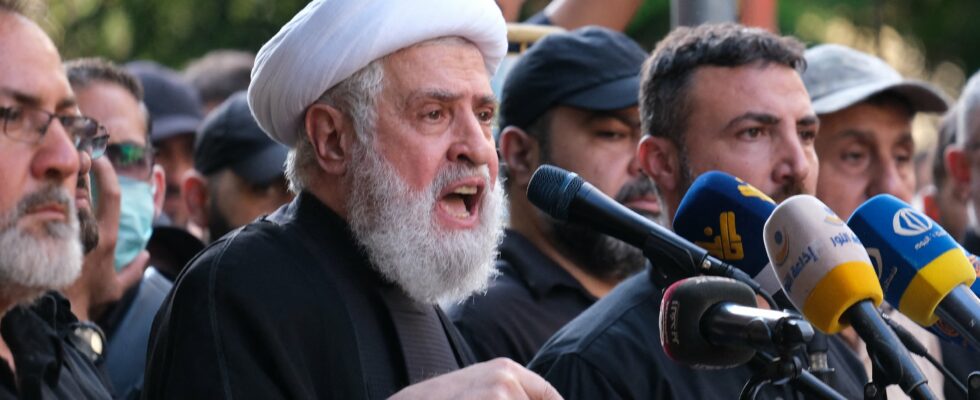After decades spent in the shadows, Hezbollah veteran Naïm Qassem, 71, takes charge of the Lebanese Islamist movement this Tuesday, October 29. He was one of its founders in 1982, when Hezbollah was created under the leadership of Iran, in the wake of the Israeli invasion of Lebanon.
The journey of this man with the white beard and skull encircled by the white turban of the Shiite clergy is closely linked to that of Hassan Nasrallah, historic leader of the movement, assassinated on September 27 during an Israeli strike on the southern suburbs of Beirut. After years of playing the role of deputy, he now finds himself propelled to the front line, at a time when Israel is increasing its devastating offensives and swearing to neutralize the Shiite Islamist group.
The eternal number two projected to the forefront
At the beginning of the 1990s, as Lebanon emerged from a period of civil war (1975-1990), Naïm Qassem became deputy secretary general of the movement. When Hezbollah leader Abbas Moussaoui was assassinated in an Israeli raid in 1992, it was Hassan Nasrallah who took the reins of Hezbollah. Nasrallah and Qassem will then manage the armed organization side by side, which from decade to decade gains influence, until it becomes a key player in geopolitics in the Middle East.
While many senior leaders of the organization have been assassinated in recent weeks during Israeli bombings on Beirut, Naïm Qassem – also a member of the Shura Council, Hezbollah’s governing body – can finally claim to succeed Nasrallah. The competition was largely reduced by these Israeli bombings: Hachem Safieddine for example, a senior figure in the movement once expected to succeed Nasrallah, was killed at the beginning of October.
If Hassan Nasrallah had hardly appeared in public since the last war with Israel in 2006 and kept his place of residence secret, Naïm Qassem was until recently one of the rare Hezbollah executives to appear freely in public. Speaking French and English, born in Beirut into a family from Kfar Fila, a village in southern Lebanon, Naïm Qassem regularly gave interviews to the media before the war. In addition to his protocol functions, he also managed political questions and parliamentary and government files, according to an AFP source.
The Hezbollah academic
Since the recent Israeli escalation, Naïm Qassem has no longer appeared in public. He simply delivered three pre-recorded speeches broadcast by Hezbollah’s Al-Manar channel, asserting in each of them that Hezbollah supporters were “the sons of Nasrallah.” Less charismatic than Hassan Nasrallah, he favors speeches with a sober tone, read in classical Arabic, unlike the former leader of Hezbollah, who spoke in front of the camera, in fiery diatribes in Lebanese dialect, sometimes punctuated with biting irony .
Married and father of six children, this chemistry graduate from the Lebanese University taught in public high schools for six years, according to his official biography. Born in 1953, he has published numerous books on religious education as well as essays on politics, again according to his official website. It has a network of schools primarily attended by its community, attending graduation ceremonies every year. Before founding Hezbollah, Naïm Qassem joined the ranks of the other major Shiite movement, Amal.
As Israeli strikes rained down relentlessly on Hezbollah strongholds, killing thousands, he addressed the Israelis in mid-October. “The solution” which would allow the inhabitants of northern Israel, displaced by Hezbollah fire for a year, to return home was “a ceasefire,” he said, threatening, otherwise, to strike. everywhere” in Israel. At the end of September, a week before the assassination of Hassan Nasrallah, he attended the funeral of “great commander” Ibrahim Aqil, once the head of Hezbollah’s elite force. “Threats will not stop us: we are ready for all military scenarios” against Israel, he thundered.
